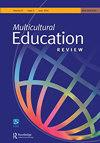Review of The homeschool choice: Parents and the privatization of education
IF 1.1
Q3 EDUCATION & EDUCATIONAL RESEARCH
引用次数: 1
Abstract
K ate Henley Averett’s book, The Homeschool Choice, is well-timed for this moment in the sociology of education, as millions of parents finish a year of makeshift homeschooling due to COVID-19 school closures. Averett collected her data from 2013–2016 (well before we knew a pandemic could bring mass education to its knees) when approximately 1.75 million children— 3.3% of the school-age population—were homeschooled in the United States. Averett surveyed 600 homeschooling parents in Texas, interviewed 46 of them, and took field notes of five homeschooling conferences. The book relies on the qualitative data and features detailed stories of parents’ motivations and experiences homeschooling their children. Although the back cover suggests the book will focus exclusively on sex education, LGBTQ content in schools, and parents’ desire to “empower—or constrain—children’s gender and sexuality,” the actual content of the book is more clearly reflected in its subtitle: “Parents and the Privatization of Education.” This is a book about neoliberal parenting and school choice. Chapter 1 provides a brief overview of homeschooling in the United States, focusing mostly on the history, the legal context, particularly in Texas, and the demographics of homeschoolers, including describing the two general arms of the subculture: conservative Christians and liberal “unschoolers.” In Chapter 2, Averett relies on that conservative/liberal dichotomy to discuss “two competing ideologies of childhood” (p. 33): Christians believe children’s developing selves are malleable and prone to influence (thus they reject “overly sexual” schools), whereas liberal parents essentialize their children’s gender and sexual selves, assuming they are fixed and need the right environment to emerge authentically (thus they reject the artificial constraints schools put on these identities). This is the most analytical chapter of the book, and although other scholars have discussed homeschoolers’ dichotomous conceptions of childhood in detail (which Averett does not engage, but should), the genderand sexuality discussion is one I have not seen in the homeschooling literature, which contributes some novel findings to the field.《家庭学校选择:家长与教育私有化》书评
亨利·埃弗里特的书《在家上学的选择》非常适合教育社会学的这个时刻,因为由于新冠肺炎学校关闭,数百万父母完成了为期一年的临时在家上学。埃弗里特收集了2013-2016年的数据(早在我们知道大流行可能使大众教育陷入困境之前),当时美国约有175万儿童(占学龄人口的3.3%)在家上学。埃弗里特调查了德克萨斯州600名在家上学的家长,采访了其中的46人,并对5次在家上学会议做了现场记录。这本书依赖于定性数据,并以父母的动机和在家教育孩子的经历的详细故事为特色。虽然封底暗示这本书将专门关注性教育、学校中的LGBTQ内容,以及父母“赋予或限制孩子的性别和性取向”的愿望,但这本书的实际内容在副标题“父母和教育私有化”中得到了更清晰的反映。这是一本关于新自由主义教育和学校选择的书。第一章简要概述了美国在家上学的情况,主要集中在历史、法律背景,特别是在德克萨斯州,以及在家上学者的人口统计,包括描述亚文化的两大分支:保守的基督徒和自由的“非学校者”。在第二章中,Averett依靠保守/自由的二分法来讨论“两种相互竞争的童年意识形态”(第33页):基督徒相信孩子的自我发展是可塑造的,容易受到影响(因此他们拒绝“过度性取向”的学校),而自由主义的父母将孩子的性别和性自我本质化,假设他们是固定的,需要合适的环境来真实地出现(因此他们拒绝学校对这些身份施加的人为限制)。这是本书最具分析性的一章,尽管其他学者已经详细讨论了在家上学的儿童的两分法概念(埃弗里特没有参与,但他应该参与),但性别和性取向的讨论是我在在家上学的文献中没有看到的,这为该领域贡献了一些新的发现。
本文章由计算机程序翻译,如有差异,请以英文原文为准。
求助全文
约1分钟内获得全文
求助全文
来源期刊

Multicultural Education Review
EDUCATION & EDUCATIONAL RESEARCH-
CiteScore
1.80
自引率
0.00%
发文量
17
期刊介绍:
Multicultural Education Review (MER) is a peer-reviewed journal for research about diversity and equity in education. Aiming to provide a truly international and multidisciplinary forum for the discussion of educational issues, MER welcomes original contributions that explore various aspects of policy and practice in education around the world. As an official scholarly journal of the Korean Association for Multicultural Education, MER is published in March, June, September, and December.
 求助内容:
求助内容: 应助结果提醒方式:
应助结果提醒方式:


